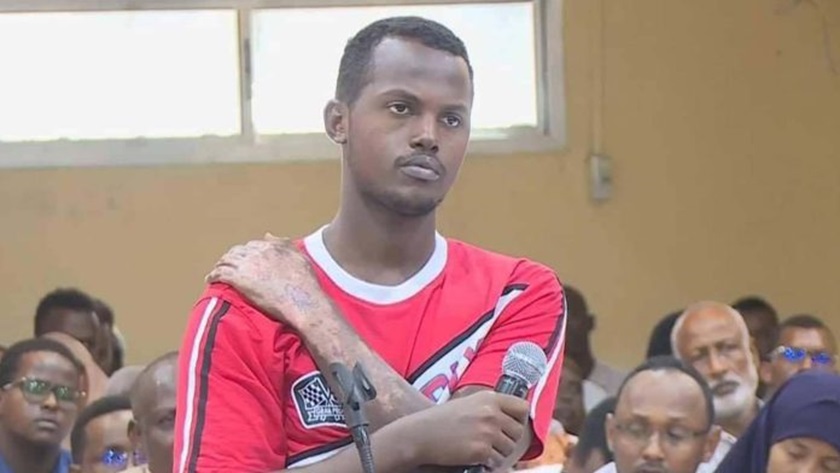By Othman Hassan
Family values and the role of the husband hold significant importance in Somali culture, which is deeply rooted in traditions and social structures that prioritize family cohesion and responsibilities. The husband’s responsibilities as provider, protector, spiritual guide, and role model are integral to maintaining the family’s well-being and cohesion. On the hand, traditionally the wives are the cornerstone of the families, playing a pivotal role in maintaining the household and ensuring the well-being of its members. Their responsibilities and influence extend beyond traditional domestic roles, deeply impacting the social, economic, and cultural fabric of Somali society. Families in Somalia are also highly interdependent, extended families often live together or maintain close connections, ensuring a robust support of network.

In the annals of crime, few acts are as heinous and heartbreaking as the deliberate murder of a wife, especially when the husband is the very person who vowed to cherish and protect her. Yet, tragically, instances of husbands burning their wives to death persist in various parts of lawless Somalia, shedding light on instability of the country, the dark realities of domestic violence and gender-based brutality. The act of burning a wife to death, often euphemistically termed a new form of femicide, has unfortunately become more prevalent, reflecting lawlessness and deep-seated issues in Somalia’s cultural erosion. While the motivations for these horrific acts vary, the most current cases are frequently linked to domestic disputes, jealousy, a desire for control and dominance, or external power struggles.
Despite these atrocities, such violence remains an anomaly within Somali traditions. A particularly disturbing incident occurred in Mogadishu on January 26th, when Sayid Moalin set his wife, Lul Abdiasis, on fire, resulting in her death. Although, a court in Mogadishu handed down a death sentence to Sayid Moalim after he was found guilty of burning his wife to death. Nevertheless, this tragic event underscores the urgent need to address and combat domestic violence and femicide in Somalia. One of the most disturbing aspects of this crime is its methodical cruelty. In the most leafy case, the husband douses his wife in flammable substances before setting her ablaze. The agony and terror experienced by the victim in those agonizing moments defy comprehension, leaving scars not just on her body but also on the collective conscience of society including the orphans she left behind.
Moreover, a husband setting fire to his wife is a stark manifestation of Somalia’s lawlessness and instability, highlighting the country’s lack of effective government and rule of law. Such heinous acts underscore the profound deficiencies in the judicial system and the pervasive influence of powerful tribal affiliations that often shield perpetrators from accountability. This brutal form of femicide not only reflects the personal tragedy of domestic violence but also serves as a broader indictment of systemic failures within Somali society.
What drives a man to commit such an atrocious act against the wife he once professed to love becomes societal norms that condone or even encourage violence against women play a significant role. The prevalent new practices where a woman’s worth is measured by her ability to bear children, fulfill domestic duties, or bring a substantial income resource, a wife can become vulnerable targets for abuse and exploitation in this lawless conflict zone of horn Africa. Furthermore, the complicity of families and communities in perpetuating silence or covering up these crimes exacerbates the problem. Fear of social stigma, or reprisals from powerful family networks may prevent victims from seeking help or justice.
Nevertheless, a lack of effective legal mechanisms, corruption within law enforcement, and a sluggish judicial process often result in impunity for perpetrators, further emboldening them to commit such heinous acts. The killer, often from a member of a powerful tribe or community receive protection from prosecution due to their social tribal status, influence, or connections within the weak government. This involves exerting pressure on law enforcement agencies, intimidating witnesses, or manipulating the legal process. As a result, the government with its feeble justice system is unable or unwilling to hold the killers and criminals accountable for their actions due to corruption, political interference, or a lack of resources and infrastructure to properly investigate and prosecute crimes.
Furthermore, in connection to this, the witnesses, law enforcement officials, and even judges fear retaliation from the killer’s tribe or community if they attempt to pursue justice. This fear result in a reluctance to speak out or take action against the perpetrator undermining the chances of achieving justice. Since the victims of the crime, often belonging to less powerful or marginalized tribe further disadvantaged by the lack of justice. Their voices are ignored or silenced, perpetuating cycles of oppression and inequality within now norms society.
Preventing such atrocities requires a comprehensive and sustained effort to address both the immediate and underlying causes of violence. When a killer is protected by a powerful tribe from a weak justice system, it highlights systemic failures and the unequal distribution of power and privilege within society. Gender violence and preventing husbands from burning their wives to death requires a multifaceted approach that addresses not only the symptoms but also the root causes of this violence. This includes challenging harmful gender norms, promoting education and economic empowerment for women, strengthening legal frameworks, and fostering a culture of zero tolerance for violence against women. Simultaneously, it is crucial to address broader societal changes to challenge entrenched power dynamics and ensure that all individuals are held accountable for their actions, regardless of their social status or affiliations.
Othman Hassan

Leave a Reply